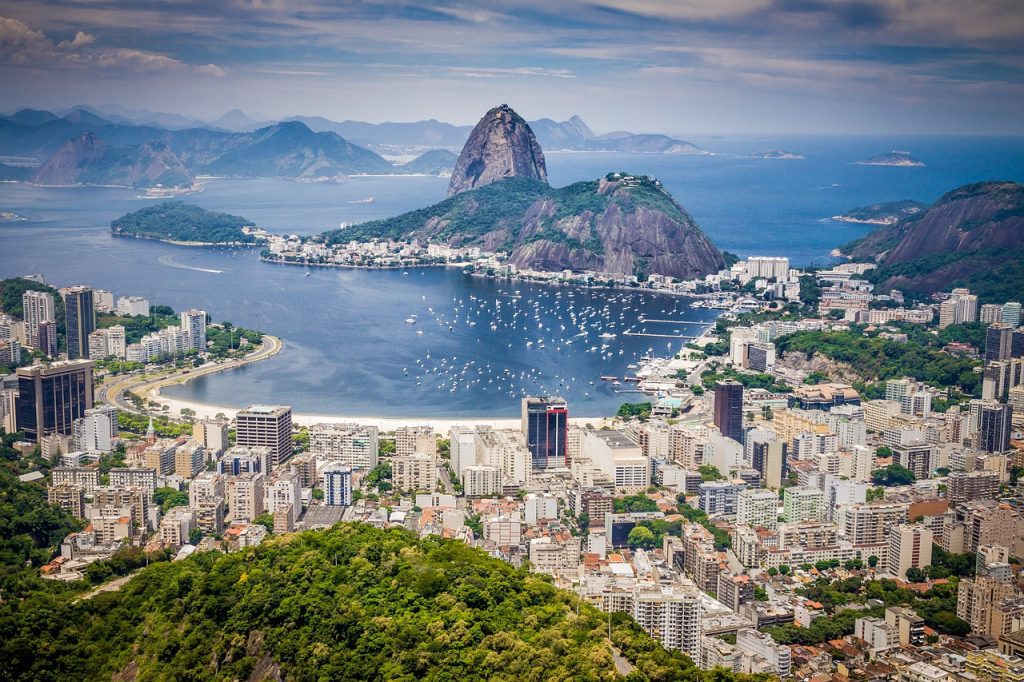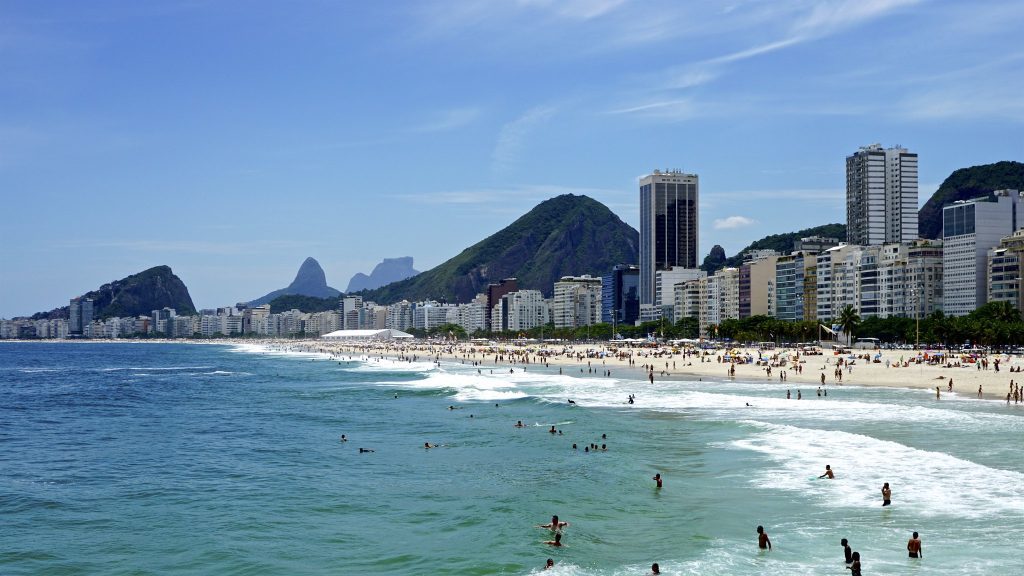Table of Contents
What to Know Before Going to Rio de Janeiro
Rio de Janeiro is among the most visited cities in Brazil, and there are many reasons for that. In addition to the famous Carnival, and beautiful beaches along its extensive coast, there is yet another differential: a tropical climate that guarantees sun and heat almost the whole year. Before planning your trip to the ‘Wonderful City’ as it is known, be aware of these basic tips that go beyond the cliché tours like Corcovado and Sugarloaf Mountain, and will ensure a pleasant and safe stay. Here’s what to know before going to Rio de Janeiro, Brazil:

Safety Tips for travel to Rio de Janeiro
- Avoid using a mobile phone on the street. It is very common for phones to be stolen (the thief gets close, grabs the device, and runs away). If you need to use your mobile phone while on the street, go into a store or supermarket and use it inside where there are always security guards.
- Avoid wearing expensive necklaces and watches on Copacabana and Ipanema beach (for example).
- If you go to a bar, do not accept drinks from strangers, especially if it is an LGBTQ space, because of the “good night Cinderella” scam (one gets roofied when someone spikes his/her drink with a drug without his/her knowledge). If the bartender brings you an open drink (without the protective seal, as in the case of soda cans) ask him to bring another one and open it in front of you.
- Avoid taking taxis in Rio de Janeiro. Taxi drivers are the same all over the world. Use a transportation app like Uber when you arrive at the airport and use the subway to move around the city.
- Never accept a guy to shine your shoes. They will charge you a fee before and after they finish the service they will demand three times more. Most of time, they are at Copacabana Beach on the sidewalk.
Note: Many people who watched the movie Turistas filmed entirely in Brazil were scared that organ trafficking really happens here. The answer is no, there are no records of tourists being kidnapped to have their organs like heart, and kidneys stolen.

Where to stay in Rio de Janeiro
There are many options to stay in Rio, from hostels to hotels for all budgets. Below are two basic tips according to the traveler’s preference:
Central Region
The accommodations here are cheaper and for those who like bohemian nightlife, it can be a good option. If you go during the Carnival period, it is the best place to stay, because you can reach the Sambadrome by subway. This year, the Carnival parade will be held in April due to the pandemic. (this information may change if the pandemic increases)
The best place to stay in the center is in the Lapa area, the bohemian part of town, especially on Fridays and Saturdays when the bars and streets get crowded. Pay attention to safety, some streets are a bit deserted at night and some of them are prostitution points for transgenders.
Selina Lapa
It is in a great location, has a terrace, and the rooms are large and comfortable. Rates start at: R$ 254 reais per night (double room).
Hotel Vina Del Mar
Good location a few steps away from the famous Arcos da Lapa. The rooms are not large, but functional, especially if the intention is just to sleep and stay out all day. Start at R$162 reais per night (double room).
Le Chateau Lapa Boutique Hotel
Good location, beautiful architecture, large and comfortable rooms, spa available, as well as having artwork that is part of the decoration of the hotel. Rates start at R$ 350 reais per night (double room).
Note: Rates are for April 2022. Hostels located in the region are not available in April.
South Zone (Copacabana, Ipanema, Leblon, Botafogo, Flamengo, etc)
These are the neighborhoods where the famous beaches like Ipanema and Copacabana are located. Rates are usually more expensive, and there is a big difference between staying in front of the sea or a little further away from it.

Copacabana
Olinda Rio Hotel
Located in front of Copacabana beach, it has charming rooms, but they are not large. Easy access to transport such as the subway (750 meters away). Rates start at R$611 reais per night (double room – sea view)
CabanaCopa Hostel
A well-rated hostel, with a very youthful appearance, overlooking a green area and mountains from the rooftop. It is located an 8-minute walk from Copacabana Beach. It has shared and private rooms. Rates start at R$ 191 reais per night (double room with restroom).
Ipanema
El Misti Hostel Ipanema
El Misti is a hostel chain spread across Rio de Janeiro. The rooms are clean and small, but in a good location, 2 minutes from the beach and 5 minutes from the subway station. It is a hostel that attracts many young backpackers from all over the world. For solo travelers it is a good place to make new friends, as the hostel also promotes barbecues and has a lively bar. Rates start at R$320 reais per night (double room with restroom).
Mar Ipanema Hotel
Very comfortable hotel, located 100 meters from the famous Ipanema beach. The street on which it is located is full of shops and restaurants, and the rooms are spacious, ideal for guests who value comfort and space. Rates start at R$ 676 per night (double room).
Note: Copacabana and Ipanema are the most sought-after regions by travelers. Besides the beaches, it is possible to access other places on foot, such as the Copacabana Fort, Leme Fort, Arpoador Rock, or even the Leblon viewpoint and other interesting places. Other neighborhoods in the South Zone such as Botafogo, Flamengo, etc have accommodations, but it is not the main focus of tourists.
General Information for Travel to Rio de Janeiro

The language in Brazil is Portuguese, and unlike Europe, few people in Brazil speak English. In hotels and hostels it will be easy to find employees who speak fluent English, but don’t expect the same from taxi drivers or employees at tourist attractions. Using online translators you will have fewer problems.
Don’t drink water from the tap. Always drink mineral water from bottles or from water filters. Although the water in Brazil is not like in India, it is not recommended to drink from the tap.
Avoid eating street foods like boiled green corn, hot dogs, and other things. Sometimes the sanitary conditions are not good.
These are 11 delicious snacks and sweets to try in Brazil.

Unusual Tours in Rio de Janeiro
(US$ 1dollar corresponds to approximately 5.33 reais, quote may vary)
Gruta do Acaiá (Ilha Grande island – Rio de Janeiro)

The cave is a cavity formed by a narrow passage that leads to a seawater well, with a type of submerged tunnel, where sunlight enters. The Grotto is one of the natural treasures of the paradise island of Ilha Grande, easily accessible for tourists, and having good accommodations. Price: start at R$25 reais per person.
Note: Ilha Grande is an island located 2 hours from Rio de Janeiro (city), and it is necessary to take a bus and a boat afterward.
Check out these other easy trips around Rio de Janeiro.
Hang gliding in Rio de Janeiro

The Pedra Bonita ramp is in Tijuca National Park. It is located at a height of 517m and the landing is at Praia do Pepino (Pepino beach), on a lawn or even on the sand. The flight lasts between 7 and 15 minutes, and the maximum weight limit is 95kg, remembering that this may vary depending on the weather condition and height of the person.
Flight price: start at R$ 600 reais, usually includes transportation to the take-off ramp and mandatory insurance.
Helicopter over Rio de Janeiro

The flight can be taken by two people, and they vary from 25 to 30 minutes. The traveler chooses the duration of the tour; it is possible to fly over Corcovado, Sugarloaf Mountain, the favelas, beaches, and other beautiful places.
Price: start at R$660 reais per person.
Beaches like Ipanema, Copacabana, Leme, and Leblon are full of tourists and also locals, but if the traveler wants to visit more beautiful beaches, clean and without tourists (only locals), he/she will have to take an Uber to go to the beaches located in the neighborhoods of Recreio and Barra da Tijuca. Grumari for example, is an almost wild beach that attracts people from all over the city, it will take almost one hour to get there, but it is worth it, next to Grumari is Abrico Beach, the most famous nudist beach in Rio.
Yearly Events in Rio de Janeiro
Festa de São João (Saint John’s party): June
The festivities have a religious (Catholic) origin as a tribute to the saints and include group dances, typical foods, a large bonfire, and people wearing rustic clothes. These celebrations take place all over the country, but it is most notable in the state of Paraíba, in the northeast of Brazil.
New Year Eve – December
Everywhere the celebration of New Year’s Eve takes place on December 31.In Brazil, Rio de Janeiro ended up becoming the main focus of celebration with the famous New Year’s Eve on Copacabana Beach, which attracts tourists from all over the world. In addition to the fireworks, there are also concerts by several famous artists.
Staying in Ipanema or Copacabana is the best option on New Year’s Eve, where you can go on foot, since public transport after midnight on that date is almost impossible, that’s why many people camp on the beach.
Note: There are other festivals in Brazil, but they are not national, occurring in specific states.
Areas to Avoid in Rio de Janeiro
Avoid visiting the city center on weekends, except in the Porto Maravilha area (Port region that has undergone an urban revitalization). On weekends most downtown area is deserted because people are off duty. Visit cultural centers and historic alleys during the week when the area is busy.

Best season to travel to Rio de Janeiro
The most expensive season is in summer, when New Year’s Eve and Carnival happens (this year it will be in April, initially).
Spring: Between September and December the weather starts to get warm in Rio, it can reach 30º C (86°F). It can also rain on some occasions.
Summer: December to March is the hottest time and it can easily reach 40ºC (104°F). The beaches are crowded, sometimes there are sporadic rains that do not alleviate the heat.
Autumn: From April to June, the temperature is cooler and pleasant.
Winter: from the end of June to the middle of September, the weather is around 23° C (74°F). For those who don’t like sun or very hot temperatures, it can be a good option, although some Cariocas (who are born in Rio) say that there is no winter in Rio de Janeiro.

What to Know Before Going to Rio de Janeiro
Let us know your tips for traveling to Rio de Janeiro in the comments below.




